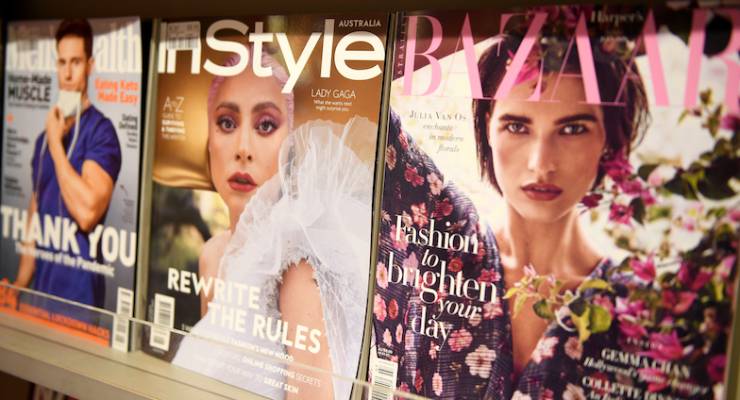
The already paltry number of publishers catering to women in Australia somehow shrank again last week when Bauer Media Australia axed eight titles including Harper’s Bazaar, Elle, OK!, Women’s Health and InStyle. This came one month after Bauer sold Woman’s Day and New Idea for a loss.
The subsidiary of its German parent company blamed the pandemic, but others have pointed to “a baffling digital strategy” and “a combination of ineptitude, hubris and poor timing”. An estimated $800 million was lost over eight years before the magazine publishing company was ultimately sold to a private equity group in June.
Former Harper’s Bazaar features editor Kirstie Clements was one of dozens of staff told on a Tuesday morning Zoom meeting their jobs would be axed.
“I don’t think you can say ‘it was badly managed by X, Y and Z’,” Clements tells Crikey. “There have been years of degradation to that lifestyle title category. [It’s] a broken business model when it comes to profitability, and add to that a pandemic and a probably very serious recession.”
Clements, who served as the editor-in-chief of Vogue Australia for 13 years, says there are few investors with an “emotional attachment” to the product left in women’s media.
“You have someone like Condé Nast who started Vogue, [Kerry] Packer loved his magazines, [Rupert] Murdoch loves The Australian but you’re not dealing with people [like that] here, it is just a different business model,” she says.
The Bauer cuts are just the latest spasm in an ongoing contraction of titles catering to women. In 2013 Grazia closed (after five years in print), in 2016 Cleo closed (after 44 years in print), in 2018 Cosmopolitan Australia closed (after 45 years in print) and the gaps left on the newsagents’ shelves have not been filled by an unfurling of online offerings.
Australia might never have anything as sophisticated but playful as New York Magazine’s The Cut, as intersectional as Salty or gal-dem, as unapologetically messy as Jezebel, or as sartorially quirky as Man Repeller but our online pickings are getting slimmer every month.
Even those with big publishers behind them can’t seem to survive: News Corp’s Whimn closed last month just a few years after it opened with plans to be “the number one female news and information source in the country” and Nine’s Daily Life no longer houses a stable of must-read columnists.
What remains? The unstoppable Mamamia with its behemoth podcast network; a handful of gossip and fashion magazines; a bunch of smaller indie publications; and, as Clements says, bloggers and Instagrammers.
“No one is looking for that one font of all information now and people can just follow people who they like,” she says. “But there’s something to be said about what will be lost when the trusted mastheads go. I don’t want Facebook’s take on fashion… no one wants [Mark Zuckerberg] in charge of the beauty pages.”
Clements points out that the closure of the Bauer titles will not only affect the immediate staff, make-up artists, photographs, stylists and associated fashion brands. “Think of the people that magazines nurture and promote: the rising stars, actresses, people in the arts sections with their books, film, music and dance,” she says.
Many women won’t mourn the loss of some titles responsible for polluting our brains with celebrity gossip and messaging that can take years to unpick: that we should dress for our body type instead of accepting our bodies, that the ideal woman is straight, white, able-bodied and impossibly thin, that the sexual needs of men should eclipse our own and that if we spend enough on beauty products we will be happy and fulfilled.
But Clements notes women’s magazines are just another place for women’s stories and there is a “lovely emotional bond” between them and readers. “There was still this sisterhood, these real nuggets of women sharing their life stories with each other even amongst the Louboutin ads.”
She is disappointed the incoming October issue of Harper’s Bazaar won’t go ahead as it was to include the publication’s annual list of “Visionary Women”. She was also working on a series about the “march towards anti-intellectualism” with 10 of Australia’s eminent female thinkers.
“Where do you put something like that now?” she asks. “Goneski.”








Crikey is committed to hosting lively discussions. Help us keep the conversation useful, interesting and welcoming. We aim to publish comments quickly in the interest of promoting robust conversation, but we’re a small team and we deploy filters to protect against legal risk. Occasionally your comment may be held up while we review, but we’re working as fast as we can to keep the conversation rolling.
The Crikey comment section is members-only content. Please subscribe to leave a comment.
The Crikey comment section is members-only content. Please login to leave a comment.